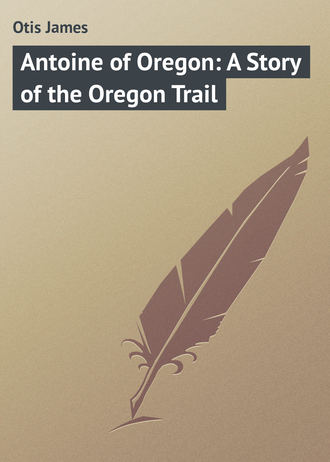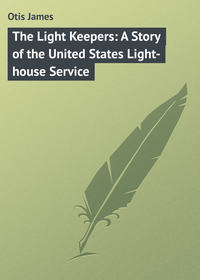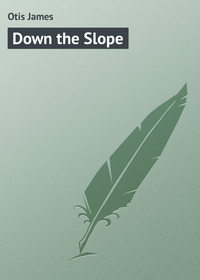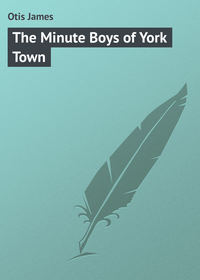 полная версия
полная версияAntoine of Oregon: A Story of the Oregon Trail
We left Rock Creek a full hour before daylight, urging the famished beasts at their best pace while we ourselves strove not to think of food lest the hunger which beset us should become more keen. Not until forty-two miles had been traversed did I give the word to encamp, and it was full time, for I question if we could have held on half an hour longer.
NEARLY EXHAUSTED
Then we had arrived at Salmon Falls Creek. It was nearly nine o'clock in the evening when we came to a halt, and during the last half hour of the march we had been more nearly asleep than awake. At this camp we found a scanty crop of grass, but no food for ourselves, and when, weary to the verge of exhaustion, we crept under such shelters as had been put up hurriedly in the darkness, it was with the knowledge that sleep would come quickly, enabling us to forget, even for a short time, our great needs.
From this point the next camping place would be on the bank of the Snake River, at what is known as the first crossing, twenty-five miles away, and then we had before us a journey of seventy-three miles to the Boise River, after which we must march forty-eight miles farther in order to gain Fort Boise, where food could be had.
One hundred forty-six miles stretched out ahead of us before it would be possible to satisfy our hunger, and this distance could not be covered in less than three days. Our animals were so nearly worn out with severe work and lack of food that it did not seem possible we could advance another ten miles, and yet all that long distance must be traversed unless we gave up the struggle, leaving our bones to bleach on the trail, as many another had done before us.
Now and again we came upon ghastly evidences of death, in wrecks of wagons and tokens of human beings who had perished by starvation. Perhaps it was well we saw those things, since they forced our people to struggle all the harder.
We traveled in silence during the three days before arriving at Fort Boise, eating nothing at noon, and for breakfast and supper receiving no more than enough to prove how desperately hungry we were. I strove to keep my mind fixed upon the danger which might menace from Indians, in order to be ready to guard against it; but the others, even including Susan, rode or walked listlessly, as if already despairing of ever being able to accomplish the task before us.
The animals moved feebly; twice an ox fell in the yoke, refusing to rise again, and we were forced to leave him behind. The men worked half-heartedly when it became necessary to double the teams in order to haul the wagons over the rough road, and so great became the suffering of all that we moved onward as if in a dream.
ARRIVAL AT FORT BOISE
I shall not speak of that terrible time, save to say that the good God permitted us to arrive finally at Fort Boise at the very moment when I believed there was no hope of our succeeding. It was as if we had been dead and come alive again, when the trappers came out to meet us, and carried the women and children into the inclosure, for, having arrived where grass could be found, the hungry beasts came to a full stop nearly a quarter mile distant, nor was it possible to force them forward a single pace farther.
Fort Boise is a Hudson's Bay Company's post, and if the trappers and traders there had been members of the American Company they could not have treated us with greater kindness. Because of our exhausted condition the men took entire charge of our cattle, and we were treated almost as children, being waited upon during the first hours after our arrival as if we were not capable of caring for ourselves, which I suppose really was the case, for if we had been allowed to have all the food we desired some of the weaker ones might have eaten until they died.
Two days at this post served to put the members of the company, as well as the cattle, in fairly good condition, and the men who had treated us so kindly urged that we take our departure without further loss of time lest we be overtaken by snowstorms while among the Blue Mountains, which range it would be necessary to cross before we arrived at the Oregon country.
ON THE TRAIL ONCE MORE
I understood that such advice was good, and when John Mitchell would have lingered despite the advice of the trappers, I took it upon myself to insist that we go forward, picturing to him in the most vivid colors the result if winter came upon us before we had scaled the mountain range.
In order that we might not overtax our newly acquired strength, we brought the first day's march from Fort Boise to an end at the bank of the Malheur River, sixteen miles distant. Next day we traveled thirty-one miles to Burnt River, where we halted one day to make ready for a sixty-mile journey to Powder River.
To make any attempt at describing this part of our journey would be repeating the words I have set down many times before. The trail was as rough as can well be imagined, and the labor of getting the heavy wagons along quite as great as had been found elsewhere.
Because of the supplies bought at Fort Boise, we did not suffer greatly from hunger, although we were allowed only a small portion of food each day; but the animals were in a half-famished condition all the while until we had arrived at the Grande Ronde, which is a beautiful valley among the mountains, where grass can be found in abundance.
There in that excellent camping place we remained two days, the cattle meanwhile feeding greedily, as if realizing that it was necessary they add to their strength in order to make the journey over the mountains, fifteen miles away.
Refreshed by the long halt, we began to climb the Blue Mountains, where the trail led over such steep ascents that it became necessary to yoke all our cattle to one wagon, pull it a mile or two up what was much like a cliff, and then drive the oxen back for another load, thus winning our advance with the greatest difficulty, and after the most severe labor traveling no more than seven miles in one day.
CAYUSE INDIANS
It was about the middle of September when we arrived at the Umatilla River, where is an Indian village under rule of the chief Five Crows of the Cayuse tribe, and a more friendly tribe I have never seen. They had not a little land cultivated, – of course all the work had been done by the squaws, – and stood ready to trade with us for whatever we had, but were more eager for clothing than anything else.
On leaving the valley, the trail runs straight up the bluff, over a high, grassy plain, affording fairly good footing for the animals; but when we halted that night it was necessary to carry water from the stream no less than a mile and a half up on the ridge, to our camp.
Two days later we came upon a village of the Walla Walla Indians, who, instead of begging, offered us venison and potatoes and seemed to be much pleased when we accepted their gifts; we lingered with them a day, for now the time had come when I could no longer call myself guide.
THE COLUMBIA RIVER
We had come within sight of the Columbia River, which was not more than four miles away, and farther than this I had never gone, for my father in his trading trips had generally halted in the Umatilla Valley, where he remained until having gathered a large supply of furs.
Now that the river was in full view, any of the party might have led the way, for the trail was fairly well defined; but there were so many chances of wandering out of the most direct course that I urged John Mitchell to hire one of the Walla Walla Indians to serve us until we arrived at Oregon City.
To my surprise he refused, but insisted that I finish the task.
It is true that I could continue as guide while we had the river near at hand to mark out the general course, and it pleased me much that he should be willing to put so much confidence in me, for I understood, or believed I did, when we left Independence, that he was more than doubtful whether a lad of my age could properly do that which might be required.
As I learned from the Indians, we had but one more difficult passage to make before the journey would be finished, and although the cattle and the horses were worn nearly to the verge of uselessness, I believed that by making slow marches, if the winter did not come upon us too suddenly, it would be possible to make our way through.
AN INDIAN FERRY
The way was hard, more difficult, it seemed to me, than any over which we had passed. But by working carefully, sparing the cattle as much as we could, and not forcing them more than an eight- or ten-mile march, we succeeded in passing over the bluff, until we came to the Des Chutes River.
At this stream it was necessary to have assistance from the Indians, because it would be impossible for so small a party as ours to make the crossing. The current was so rapid and violent, besides being exceedingly deep at places, that we could not hope to take the wagons over except by using canoes as ferryboats.
This last we did, lashing upon five or six of the largest a platform of poles and split logs, until there had been formed a bed sufficiently large to give room for a wagon.
It seemed to me as if John Mitchell would never make a bargain for this rough ferrying. The Indians demanded as the price of their labor almost everything they saw in the wagons, and at least three hours were spent in haggling, before we were ready to make the first venture.
Then our picket ropes were doubled and tied together until we had a length sufficient to stretch across the stream. One end of this was made fast to the platform of logs and canoes, and the other carried by a party of the Indians to the opposite side of the stream, when all the strength of every man that could be mustered was required to keep our ferryboat from striking upon the rocks.
We were two days making this passage, although the stream at its widest part is not over a hundred fifty yards, and when, finally, the task had been accomplished and we started on the last stage of our journey, it was found that, in addition to what we had given the Indians, they had succeeded in stealing a quantity of powder and shot, several shirts, and two pair of trousers, one pair of which, I grieve to say, belonged to me and were the best I ever owned.
THE DALLES OF THE COLUMBIA
I wish I could express the thankfulness and relief which came upon me on the 29th of September, when we arrived at the end of our journey, for then we had come to the Dalles, or the Methodist Missions, beyond which no wagon had ever passed.
At this place we found several families of would-be settlers waiting for a passage down the river in one of the two small boats which ran from Cascade Falls to Fort Vancouver, from which place they might continue the journey by water to Oregon City.
Here, at what is known as the Dalles of the Columbia, where the water rushes through a long, narrow channel of rock with so swift a current that when the water is high even boats propelled by steam cannot stem it, the missionaries sent out by the Methodist Church have built a few dwellings, a schoolhouse, and a barn, besides planting the surrounding land by aid of the Indians whom they have converted from a life of savagery to the knowledge of God.
OUR LIVE STOCK
I cannot take to myself very much credit because of having led John Mitchell's company without serious mishap, even though I have twice before traversed the trail from the Missouri River. Yet we had no trouble which could not be overcome by hard labor, and every member of the company arrived at the journey's end in good health, which is more than can be said of other emigrants.
When we arrived at the Dalles of the Columbia, we found there emigrants who had lost more than half of all their live stock during the long journey, and again my heart was overflowing with thankfulness, because we had suffered no great loss.
On leaving Independence there were in John Mitchell's train, as I have already set down, thirty cows, forty oxen, twenty horses, and ten mules. We arrived at the Dalles with twenty-one cows, thirty-two oxen, seventeen horses, and six mules.
MY WORK AS GUIDE ENDED
Here at the Dalles, as I have said, the journey was nearly ended, and here it is that I, Antoine, who now three times have crossed from the Missouri to the Columbia River, have come to an end of my story-telling.
In guiding John Mitchell's company over this long journey of more than two thousand miles, I did no more than show them what I knew of woodcraft, how to kill the buffalo, to stalk the antelope, to creep up on the elk, and, what in the Indian country is of the greatest importance, how to form camp so that they might be in least danger of a surprise.
My mother had come over this long stretch of country with fewer hardships than any other woman in the company. She had been, as you might say, familiar with travel in the wilderness, for twice had she been out with my father on his trading trips, and knew how to take advantage of this time of rest, or of that period of toil.
I BECOME A FARMER
Having left our home in St. Louis, we began to realize, as the end of the journey drew near, that we must look upon ourselves now as settlers in the Oregon country.
Because of not having sufficient money with which to embark in my father's business, I must content myself with becoming a farmer, that I might the better care for my mother. Even though it did not accord with my wishes to abandon the life of a trapper, yet that was of no account, so long as I was able to do my duty by my mother, even as she has done her duty, and more, by me.
Concerning the journey down the river, when we traveled comfortably on a boat, there is no reason why I should set down anything, save that we arrived at Oregon City on the twenty-second day of October. We remained at the Mission, with other intending settlers, a long time waiting for the boats, and when we arrived the journey which had been begun on the sixth day of May, if we counted the beginning when we left Independence, was at an end.
There were many matters regarding this long march of ours, many small adventures and larger misadventures, which I would dearly have loved to set down.
It would also have pleased me to tell how it was that I came to buy land on the Columbia River, with the money earned as a guide, together with what was received from the sale of the old home.
All this and more, I would like to set down in detail; but I have not the time in which to do it, therefore I will write as the last words, that I, who once claimed St. Louis as my home, while I labor with my hands in the fields for my dear mother, have put behind me the past with its lure of trapping and hunting, and learned to think of myself only as Antoine of Oregon.
1
A prepared meat carried by all travelers over the Oregon trail.











